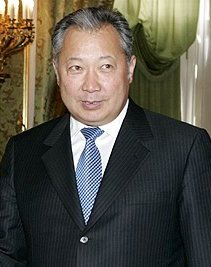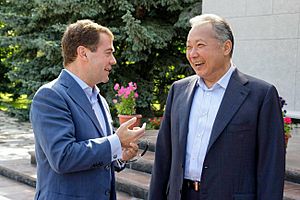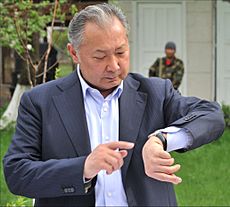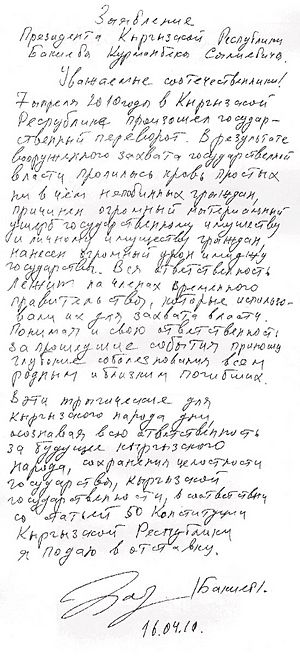Kurmanbek Bakiyev facts for kids
Quick facts for kids
Kurmanbek Bakiyev
|
|
|---|---|
| Курманбек Сали уулу Бакиев | |

Bakiyev in 2006
|
|
| 2nd President of Kyrgyzstan | |
| In office 14 August 2005 – 15 April 2010 Acting: 25 March 2005 – 14 August 2005 |
|
| Prime Minister |
|
| Preceded by | Ishenbai Kadyrbekov (acting) |
| Succeeded by | Roza Otunbayeva |
| 7th Prime Minister of Kyrgyzstan | |
| In office 10 July 2005 – 15 August 2005 |
|
| President |
|
| Preceded by | Medetbek Kerimkulov (acting) |
| Succeeded by | Felix Kulov |
| In office 28 March 2005 – 20 June 2005 Acting: 25 March 2005 – 28 March 2005 |
|
| President | Askar Akayev |
| Preceded by | Nikolai Tanayev |
| Succeeded by | Medetbek Kerimkulov (acting) |
| In office 21 December 2000 – 22 May 2002 |
|
| President | Askar Akayev |
| Preceded by | Amangeldy Muraliyev |
| Succeeded by | Nikolai Tanayev |
| Personal details | |
| Born | 1 August 1949 Masadan, Kyrgyz SSR, USSR |
| Political party | Ak Jol |
| Other political affiliations |
People's Movement of Kyrgyzstan |
| Spouse | Tatyana Bakiyeva |
| Domestic partner | Nazgul Tolomusheva |
| Children | 2 |
| Relatives | Janish Bakiyev |
| Residences | Minsk, Belarus |
| Alma mater | Kuybyshev Polytechnic Institute |
Kurmanbek Sali uulu Bakiyev (born August 1, 1949) is a politician from Kyrgyzstan. He served as the country's second president from 2005 to 2010. His time as president ended after the Kyrgyz Revolution of 2010, which forced him to leave the country.
Before becoming president, Bakiyev led a political group called the People's Movement of Kyrgyzstan. He was very popular in the southern part of the country. In 2005, after a big protest called the Tulip Revolution removed the previous president, Bakiyev was chosen to be the acting president. He later won the election to become the official president.
Contents
Early Life and Career
Kurmanbek Bakiyev was born on August 1, 1949, in the village of Masadan in what was then the Kirghiz SSR, part of the Soviet Union. His father was the head of a large farm. After finishing his studies at a technical university in 1978, he served in the Soviet Army.
He worked at a factory and later became involved in politics. By 1995, he was the governor of the Jalal-Abad Region and later the Chui Region. In December 2000, he was appointed as the prime minister of Kyrgyzstan.
Becoming President of Kyrgyzstan
After the Tulip Revolution in 2005, a special election was held. Bakiyev won the presidential election on July 10, 2005, with 89% of the vote. Many people hoped he would bring positive changes to Kyrgyzstan.
However, his time as president was difficult. The country faced economic problems, and there were many disagreements among political leaders.
Challenges and Protests
In 2006, thousands of people protested in the capital city, Bishkek. They said Bakiyev was not keeping his promises to reduce the president's power and fight corruption. The protesters wanted the parliament and prime minister to have more authority.
More protests happened in April 2007. People demanded that Bakiyev resign. On April 19, there were clashes between protesters and police, and the protests eventually ended.
Foreign Relations and Re-election
During his presidency, Bakiyev worked to build a strong relationship with China. He also worked closely with Russia. In 2009, after a meeting with the Russian president, Bakiyev announced that a U.S. Air Base would have to leave Kyrgyzstan.
Bakiyev was re-elected in the 2009 presidential election. After winning, people expected him to focus on improving the country's economy and political system.
However, problems continued. In the winter of 2010, Kyrgyzstan had many power outages. The cost of electricity and heating went up, which made many people angry. This led to a large protest in the city of Talas on April 6, 2010.
Government Controversies
During Bakiyev's presidency, his government faced a lot of criticism. Many people were unhappy with how the country was being run.
Unfair Treatment of Opponents
Human rights groups reported that people who disagreed with the government were often treated unfairly. Some opposition leaders were arrested, and newspapers and TV channels that criticized the government were shut down. This created a lot of tension in the country.
One of the most serious events was the death of a major official, Medet Sadyrkulov, who had joined the opposition. His death was first called an accident, but it was later found that he had been murdered. Bakiyev's brother, Zhanysh, was said to be involved.
Family in Power
A major concern for many citizens was that Bakiyev gave powerful government jobs to his family members. This is often called a "family clan regime."
- His brother, Zhanysh Bakiyev, was put in charge of the state security service.
- His son, Maxim Bakiyev, was made the head of a new government agency for development and investment.
Many people felt it was unfair for one family to have so much control over the country. Maxim Bakiyev was also accused of using his position to make a lot of money for himself through a bank he owned.
Misuse of Government Funds
The Bakiyev family was accused of making money from contracts to supply fuel to the U.S. military base at Manas. It was reported that companies connected to the family received large payments. One of Maxim Bakiyev's business partners later said that the family had taken hundreds of millions of dollars out of the country.
Despite these issues, Maxim Bakiyev was later given asylum in the United Kingdom.
The 2010 Revolution
In April 2010, large and violent protests broke out in the capital city. The protests, now known as the Kyrgyz Revolution of 2010, led to the government being overthrown. Bakiyev fled the capital and went to the southern city of Osh.
A new temporary government was formed, led by Roza Otunbayeva. She stated that Bakiyev had not officially resigned and was trying to gather supporters.
On April 15, 2010, Bakiyev signed a resignation letter and left Kyrgyzstan for Kazakhstan. The new government said it would still try to bring him to trial.
Life in Exile
A few days after leaving Kyrgyzstan, Bakiyev moved to Minsk, the capital of Belarus. The president of Belarus, Alexander Lukashenko, announced that Bakiyev and his family were under the protection of the Belarusian state.
From Minsk, Bakiyev said that he did not accept his resignation and still considered himself the president of Kyrgyzstan.
The government in Kyrgyzstan later sentenced Bakiyev to life in prison in his absence for his role in the events of the 2010 revolution. The Kyrgyz government has asked Belarus to send him back, but Belarus has refused.
In 2019, the United States government announced it was returning over $4 million to Kyrgyzstan that had been stolen by Bakiyev.
Family and Personal Life
Bakiyev's wife is Tatyana Bakiyeva. They have two sons. His younger son, Maxim Bakiyev, was charged with misusing government money after the family was removed from power.
During his presidency, several of his brothers also held important government positions. Besides Kyrgyz, Bakiyev can speak Russian and Uzbek.
Bakiyev also has a son and a daughter with his common-law wife, Nazgul Tolomusheva, who passed away in 2023.
Awards
- Order of the Olympic Council of Asia (2009)
- Order of the Commonwealth
- Order of Friendship of Peoples (Belarus, 2014)
See also
 In Spanish: Kurmanbek Bakíev para niños
In Spanish: Kurmanbek Bakíev para niños




